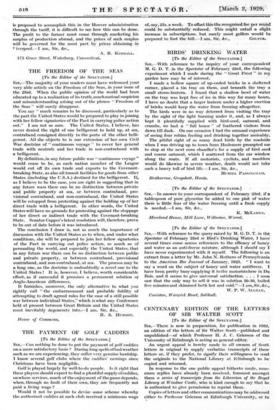THE FREEDOM OF THE • SEAS
[To the Editor of the SPECTATOR.]
Sta,—The majority of your readers must have welcomed your very able article on the Freedom of the Seas, in your issue of the 28rd. When the public opinion of the world had been educated up to a realization of its truth, muchmutual suspicion and misunderstanding arising out of the phrase " Freedom of the Seas " will surely disappear. • You say " much remains to be discussed, particularly as to the part the United States would be prepared to play in joining with her fellow signatories of the Pact in carrying police action out." I am not so sure. The United States, I believe, has never denied the right of one belligerent to hold up, at sea, contraband consigned directly to the ports of the other belli- gerent. All she objects to is our extension of her own Civil War doctrine of " continuous voyage " to cover her general trade with neutrals and her trade in non-contraband with a belligerent.
By definition, in any future public war " continuous voyage " would cease to be, as each nation member of the League would cut off its own trade and exports to the Cpvenant- breaking State, as also all transit facilities for goods from other States (including the U.S.A.) destined for the belligerent. If„ as I believe to be the case, you are right in suggesting that in any future wars there can be no distinction between private and public property at sea, or. between contraband, pro- visional contraband, and non-contraband, the United States will be estopped from protesting against the holding up of her direct trade with a belligerent. In other words, the United States will have no grounds for protesting against the stoppage of her direct or indirect trade with the Covenant-breaking State. Senator Capper's latest resolution will, therefore, prove to be out of date before it was introduced.
The conclusion I draw is, not, so much the importance of discussion with the United States as to when, and under what conditions, she will be prepared to join her fellow signatories of the Pact in carrying out police action, so much as of persuading the world, and especially the United States, that in any future war there can be no distinction between public and private property, or between contraband, provisional contraband, and non-contraband, at sea. The proms may be a long one,, as the doctrine is undoubtedly a novel one to the United States I It is, however, I believe, worth considerable effort, as if successful it promises a permanent solution of Anglo-American differences.
It furnishes, moreover, the only alternative to what you rightly call " the embarrassment and probable futility of attempting to draft agreed rules for the case of a still possible war between individual States," which is what any Conference held at present between Great Britain and the United States must inevitably degenerate into.—I am, Sir, &c.,
House of Commons.
R. S. HUDSON.
























































 Previous page
Previous page